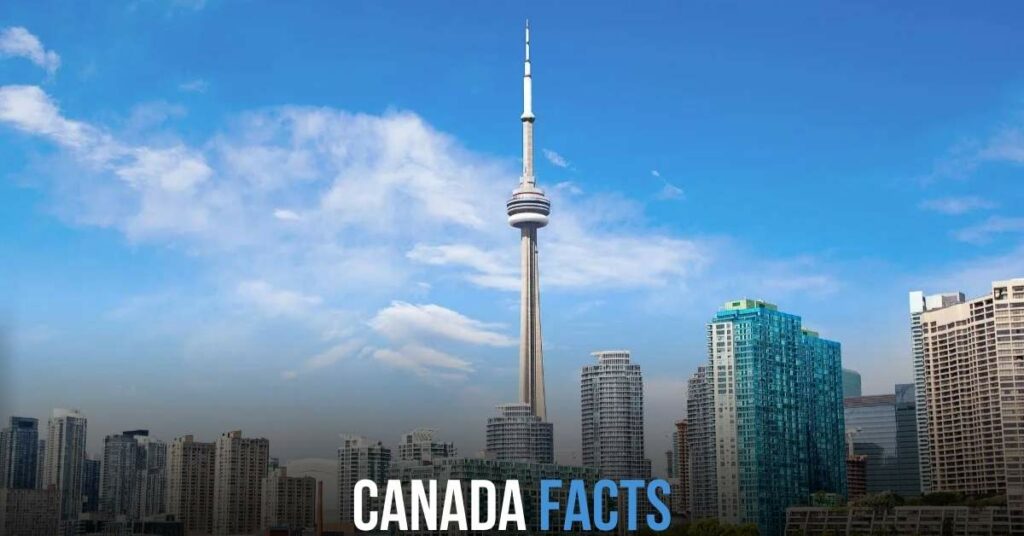Canada, often referred to as the “Great White North,” is a country filled with natural wonders, a rich history, and a unique cultural tapestry. From its vast landscapes to its diverse population, Canada has a lot to offer. In this blog post, we’ll explore 30 intriguing facts about Canada, shedding light on its history, geography, culture, and more.
1. The Giant of North America
Canada is not only the largest country in the Western Hemisphere but also the second-largest in the world, trailing only behind Russia. Its massive landmass stretches over 9.98 million square kilometers, making it an undeniable behemoth on the global stage.
2. The World’s Longest Coastline
With a staggering 202,080 kilometers (125,567 miles) of coastline, Canada claims the title of having the world’s longest coastline. It’s a land of countless bays, inlets, and islands that create a diverse and breathtaking waterfront.
3. Home to Gigantic Islands
Canada boasts three islands among the top ten largest islands globally: the Baffin Island (more than twice the size of Great Britain), Victoria Island, and Ellesmere Island (both approximately the size of England). These immense landmasses contribute to Canada’s vast expanse.
4. Lakes Galore
If you’re a fan of lakes, Canada is your paradise. More than half of the world’s lakes are found here, totaling over 3 million lakes. Among them, 31,700 are sizable, covering more than 300 hectares. Canada also claims two of the largest lakes globally: Great Bear Lake and Great Slave Lake.
5. Toronto: The Metropolis
Canada’s largest metropolis is Toronto, home to approximately seven million people. This thriving city is a cultural and economic hub that embodies Canada’s multicultural identity.
6. Multilingual Canada
Canada recognizes two official languages: English and French. This linguistic diversity reflects its colonial history, with French-speaking populations primarily found in Quebec, contributing to the nation’s unique bilingual character.
7. Vikings in Canada
Before European colonial powers like France and Britain, the Vikings, led by Leif Erikson, explored Canada’s Atlantic Coast around the year 1000 AD. Their brief presence marked the earliest European contact in Canada’s history.
8. John Cabot’s English Expedition
In 1497, Italian explorer John Cabot, sailing under the English flag, explored Canada’s Atlantic Coast and claimed it for England. His journey set the stage for future European exploration and colonization.
9. Beaver Wars
The “Beaver Wars” of the 17th century were a series of brutal conflicts between indigenous tribes, primarily the Iroquois, and European colonists vying for control of the lucrative fur trade. These wars were pivotal in shaping the region’s history.
10. The Humble Beaver
Canada’s national animal is the beaver. It played a crucial role in the fur trade that helped shape the nation’s economy and history. Today, it’s a symbol of Canadian heritage and resilience.
11. Loonies and Toonies
Canadian currency features unique coins, including the “loonie” (one-dollar coin) and “toonie” (two-dollar coin). These distinctive names reflect Canada’s quirky currency culture.
12. Lacrosse: The National Summer Sport
Lacrosse, a sport of indigenous origin, holds the title of Canada’s national summer sport. It gained popularity in Canada in the 19th century and remains a cherished part of the nation’s athletic heritage.
13. Full Independence in 1982
Canada achieved full legislative independence from Britain in 1982 with the passage of the Canada Act. Prior to this, the British Parliament had the authority to amend Canada’s constitution.
14. Canada Day Celebrates Independence
Canada Day, celebrated on July 1st, commemorates Canada’s semi-independence from Britain in 1867. It’s a day of national pride marked by festivities, parades, and fireworks.
15. Trans-Canada Highway
The Trans-Canada Highway spans from the Atlantic to the Pacific Ocean, covering 4,860 miles. It’s one of the longest national highways globally, offering travelers breathtaking views of Canada’s diverse landscapes.
16. The Maple Leaf: A Symbolic Emblem
The iconic maple leaf has been a symbol of Canada since the 18th century. It represents Canadian identity and is prominently featured on the country’s flag.
17. World’s Oldest Water Pool
Deep underground in Timmins, Ontario, lies the world’s oldest pool of water, estimated to be around two billion years old. It’s a testament to the ancient geological history of Canada.
18. Niagara Falls: The Power of Canada
While Niagara Falls straddles the Canada-US border, the most powerful and iconic part of the falls, the Horseshoe Falls, is located in the Canadian section. It’s a breathtaking natural wonder.
19. Toronto’s Underground Wonderland
Toronto boasts the world’s largest underground shopping complex, known as PATH. Covering four million square feet, it provides respite from the cold Canadian winters while offering a shopping paradise.
20. Grand Railway Hotels
Canada’s grand railway hotels, such as the Banff Springs Hotel and Hotel Vancouver, showcase the chateauesque architectural style. They are not only luxurious accommodations but also a testament to Canada’s history.
Canada, with its vast wilderness, unique cultural heritage, and welcoming society, continues to captivate and inspire people from around the world. These 30 facts offer a glimpse into the richness and diversity that define the Great White North. Whether you’re exploring its natural wonders, immersing yourself in its history, or enjoying its cultural tapestry, Canada is a nation full of surprises and beauty.
